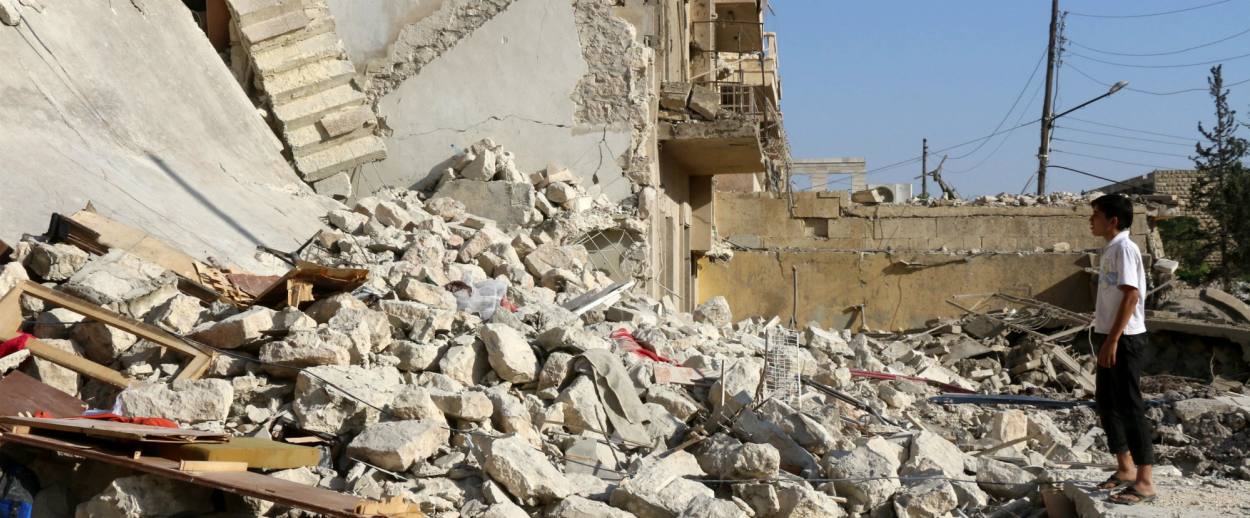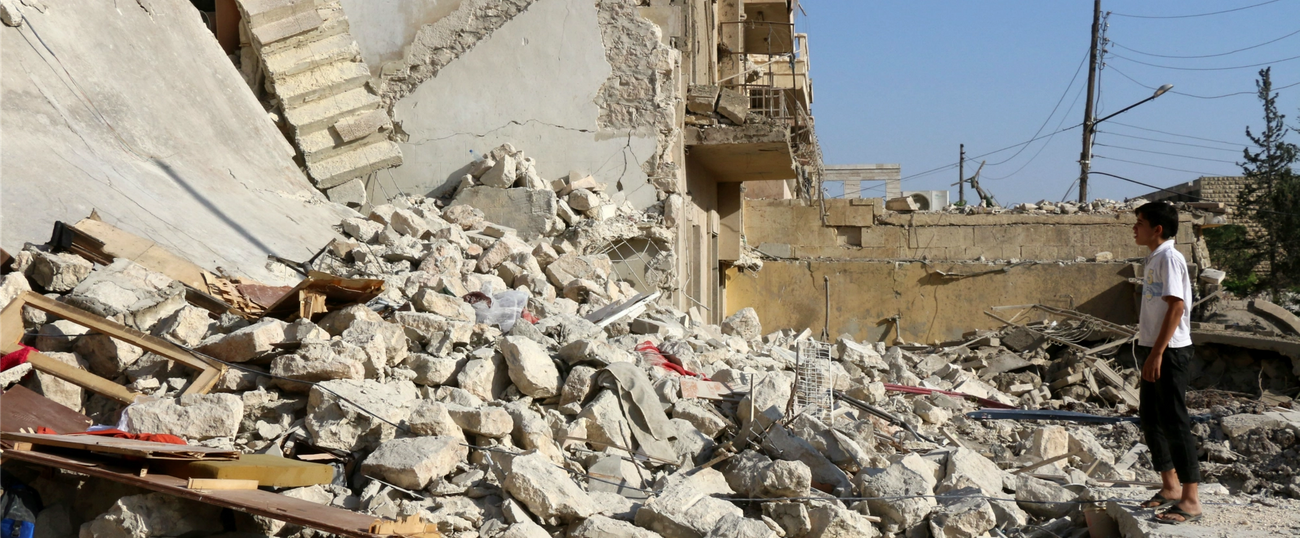Making the Anti-Assad Case in Washington
The Syrian American Council operates in a challenging political climate, as civil war rages on in Syria, and attention to the crisis flags in the U.S.




Few political movements have a harder case to make to the world, or to the American public and its leaders, than Syria’s secular opposition. And few movements have more reason to feel discouraged or abandoned right now. An organization like the Syrian American Council, for example, faces a morass in both Syria and Washington, D.C., pleading the ever-imperiled case for supporting democracy in Syria even as the conflict worsens and attention to situation flags in the U.S.
The once-powerful nationalist and non-Islamist rebellion is now fighting the Assad regime, ISIS, Russia, Iran, and jihadist anti-regime groups, like Jabhat al-Nusra. A collection of non-jihadist rebel groups was recently encircled by the Syrian army in their former stronghold in Aleppo, and are coping with a number of steep geopolitical hurdles outside the country: the perception of Assad as a partner in fighting terrorism, the widespread conflation of the Syrian opposition with Sunni jihadism, a U.S. administration wary of antagonizing the pro-Assad Iranian regime and seemingly set on brokering the opposition’s surrender, and a U.S. and western public allergic to anything that even smacks of expanded involvement in the Middle East.
The opposition has seen Obama retreat from his “red line” after the August 2013 chemical weapons attack outside Damascus, and have witnessed the collapse of the U.S.’s “train and equip” program for anti-Assad and anti-ISIS Syrian fighters. After five years of fighting, the displacement of 13.5 million Syrians and the death of over 400,000 more, there’s no end to the conflict in sight.
But the people making the anti-Assad case in Washington are not exactly discouraged or demoralized. On July 20, while most of the country fixated on the chaos unfolding at the Republican National Convention in Cleveland, I met with Chad Brand and Shlomo Bolts of the Washington, D.C.-based Syrian American Council (SAC), a group whose mission is to “organize and advocate for a free, democratic, and pluralistic Syria through American support.”
SAC backs things like no-fly zones, the establishment of humanitarian safe-areas in Syria, and U.S. weapons and training assistance for the Syrian opposition. They’ve gotten a cold hearing from the White House, and have largely given up on lobbying Obama’s inner circle. At the same time, they push an attainable legislative agenda and have had some successes in Congress. House Foreign Affairs Committee chairman Ed Royce, once a problematic member of Congress from the Syrian opposition’s perspective, is now a full-fledged ally; earlier this month he helped introduce a bill authored by Democrat Eliot Engel that would expand U.S. sanctions against the Assad regime.
As Brand, one of SAC’s government relations officers, explained, Congress is “nipping at” Boeing’s controversial sale of aircraft to the Iran government, with some members of Congress insisting on measures that would ensure the planes aren’t used to ferry weapons and personnel to Syria. SAC has successfully advocated for including funding for the Syrian “train and equip” program in defense authorization bills.
And they often get a sympathetic hearing from members of Congress and their staff when they recount the abuses of the Assad regime and the dangers the Syrian government poses to global order. Congressmen and their staff sometimes learn of specific regime atrocities for the first time from SAC: “To a person they say, ‘We didn’t know about that and we wish we knew.’ The problem is that the administration doesn’t brief us on these things, Brand said. He emphasized that SAC is a nonpartisan organization, “even if and when we get stymied by the administration.”
The larger situation within Syria also provides a basis for a counter-intuitive optimism. Brand and Bolts have worked on the Syria conflict enough to understand the rapidity with which things can change. A flood of Syrian refugees can turn anti-immigrant right-wingers into advocates for safe zones in Syria, while the rise of a group like ISIS or a major nuclear deal with Iran can move liberals to argue for partnering with the Assad regime and its allies. On the ground, the dynamics are more local, and more changeable, than many observers realize. “People radicalized based on local factors can be de-radicalized based on local factors,” Bolts said of jihadist anti-regime fighters. The regime still owes its survival to the intervention of its allies: “Assad’s position is fundamentally weak,” said Bolts, who is a policy and advocacy officer with SAC.
The Syria conflict is unfolding over a vast time scale, giving advocates plenty of opportunity to change people’s minds. And there’s the presidential election. From an anti-Assad perspective, Trump has a high ceiling, but a low floor: his foreign policy is isolationist, pro-stability, and often pro-dictator. But he has advisers like Walid Fares who are viewed as sympathetic to Syrian opposition, and Trump has sometimes backed the creation of humanitarian safe zones in the country. Hillary Clinton could end up being more anti-Assad than Obama; the question is whether her policies will be different enough to fundamentally change the outlook of the conflict.
Perhaps the biggest challenge facing a group like SAC is apathy. The worse it gets in Syria, the more the conflict seems to slip out of the American public’s view.
Over the past month, the Assad regime and its Russian and Iranian partners have encircled fighters in north Aleppo, the country’s most important remaining pocket of non-Islamist resistance to the regime. Assad and his allies have bombed two hospitals in Idlib and two more in Aleppo since April. In June, Russian planes ignored repeated American requests not to attack a base supporting U.S.-aided anti-ISIS and anti-regime fighters. After several rounds of failed diplomacy, the U.S. is partnering more closely in its anti-ISIS efforts with Russia, which has waged a costly military intervention on behalf of Assad, the man most responsible for Syria’s catastrophe. And the nuclear deal with Iran has released upwards of $56 billion to another regime that’s dedicated considerable blood and treasure to propping Assad.
Not even the potentially dubious choices of their own government, or the recent global wave of attacks by supporters of ISIS, whose “capital” is in the Syrian city of Raqqa; or the reality of ceaseless death and destruction in a strategically vital part of the world, have been enough to really make Americans care about Syria, even during a fractious election year. If anything, one of the two major U.S. political parties is tacking in a sharply isolationist direction, with Donald Trump alleging that Democratic opponent Hillary Clinton had supported regime change in Syria during his July 21 acceptance speech for the Republican presidential nomination.
The fact that Americans have largely tuned out the moral and humanitarian dimensions of the conflict doesn’t mean SAC’s goals are hopeless. Bolts believes there a pragmatism to the American public and its leaders that won’t allow a situation like Syria’s to endure forever. “My own personal view is that something happens in the American political cycle when the public sees a lot of people dying repeatedly,” said Bolts. “There’s awareness for the first few massacres, and then after awhile people wonder, ‘What’s next?’ And if large numbers of people are killed, it deadens sensitivities. The main hope for us is to get people to understand the costs of their inactions….it’s not practical to ignore when tens of thousands of people are being killed.”
“Long-term, long-game, there’s reason for optimism,” he added. “It could just be a much longer time frame than a lot of us were hoping for.”
Armin Rosen is a staff writer for Tablet Magazine.